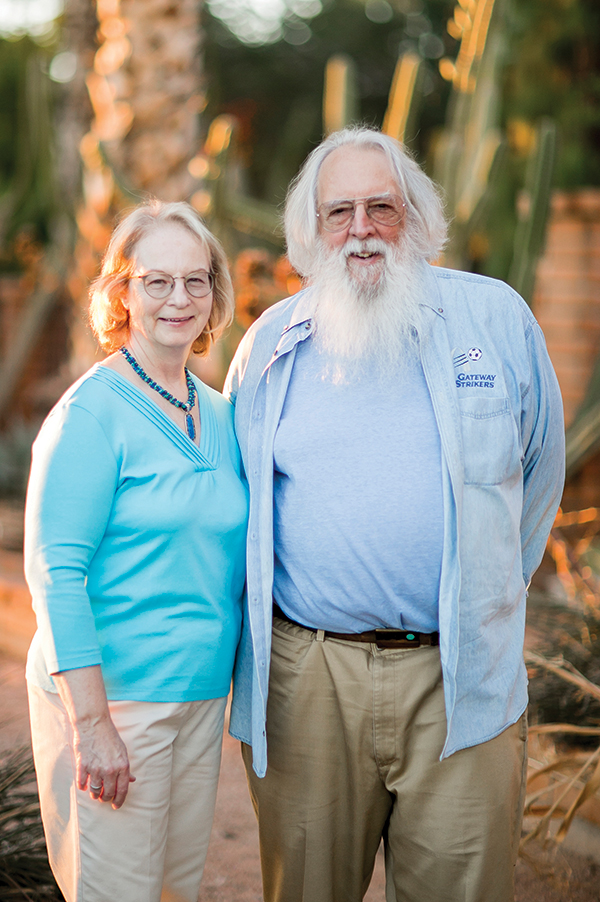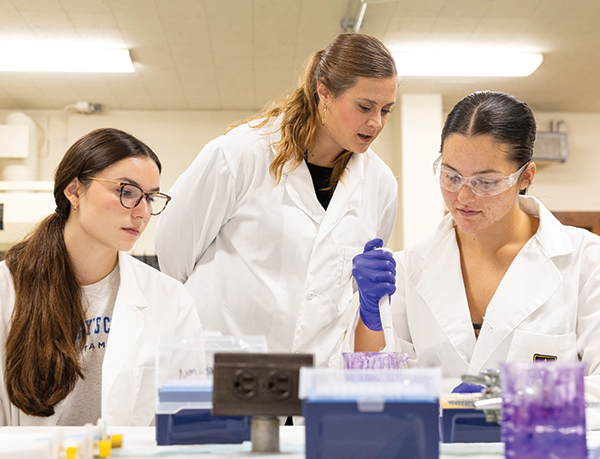Endowed Biology Professorship Honors Pioneering Alumna

Josephine “Josie” Clark-Curtiss ’68 was a woman of many firsts. Her career spanned five decades of tireless work to combat the spread of infectious disease through her pioneering discoveries in microbiology and molecular genetics research.
Among her many firsts: Clark-Curtiss was the first researcher awarded a National Institutes of Health grant for the genetic analysis of the mycobacterial pathogens that cause leprosy, tuberculosis, and the M. avium infection, which afflicts patients with HIV. She was also the first scientist to perfect a way to disrupt bacteria that have rigid, tough cell walls to isolate high molecular weight DNA, revolutionary at a time before genetic sequencing and synthesis became standard. Clark-Curtiss made this discovery with a President’s Fellowship from the American Society of Microbiology at the Medical College of Virginia, now Virginia Commonwealth University.
Sadly, Clark-Curtiss passed away from ovarian cancer in November 2023. Her husband of 47 years and research partner Dr. Roy Curtiss III recently established the Dr. Josephine E. Clark-Curtiss Professorship in Biology, along with student research funds, in her memory. In establishing this gift, Curtiss shared how impactful Saint Mary’s College was to his wife’s career, and how she hoped to assist today’s young biologists with their education.
After graduating from Saint Mary’s with a degree in biology, Clark-Curtiss earned her PhD in microbiology at the Medical College of Georgia, now Augusta University. There, she met her future husband when he presented a graduate seminar and her PhD advisor arranged a meeting for the two to discuss her research. The pair wed in 1976, becoming partners both in life and in their devotion to robust public health initiatives such as disease eradication and vaccine development, all while raising their three children, Gregory, Garth, and Megan.
“We had similar interests,” Curtiss said of the couple’s shared work. “There was a lot of cross fertilization of ideas. It was a stimulating and productive relationship, and I benefited immensely from her gracious, outgoing personality of making all sorts of friends and contacts all over the world, which was always a pleasure.”
Curtiss’s gift to Saint Mary’s in his wife’s memory, both the endowed professorship and student research fund, helps support the College’s Ring Out Ring True comprehensive campaign. Currently in its “quiet phase,” the campaign will enhance all academic programs, including those dear to the couple.
According to Provost Megan Zwart, the Dr. Josephine E. Clark-Curtiss Professorship in Biology will rotate among current Saint Mary’s faculty members in the Department of Biology. The inaugural holder will serve in the role for a six-year term, after which another member of the department will assume the role.
“This rotation ensures that, over time, several faculty members specializing in genetics, microbiology, or molecular biology will have the opportunity to grow their research alongside students and mentor them through meaningful faculty–student research collaborations,” Zwart said. “This design expands the impact of the endowment by enriching the work of multiple faculty members and creating varied, high-impact opportunities for students.”
In establishing this gift, Curtiss shared how impactful Saint Mary’s College was to his wife’s career, and how she hoped to assist today’s young biologists with their education.
-

This fall, Calli Davison Versagli ’09, associate professor of Biology, accepted the inaugural appointment. Versagli graduated from Saint Mary’s with a bachelor of science in Biology, then earned a PhD from the University of Notre Dame. Her research focus is on uterine, ovarian, and breast cancer at the cellular level.
“Dr. Clark-Curtiss did a lot of work in microbiology and molecular biology, she worked a lot with bacteria and smaller organisms,” Versagli said of Clark-Curtiss’s work decades before her. “Our parallels are that she was interested in understanding infectious disease at a molecular level and I am interested in understanding cancer at the molecular level.”
Roy Curtiss said his wife’s ability to isolate specific genes was particularly impactful. Through this, scientists can pinpoint genes within a pathogen’s DNA that code for specific proteins or antigens that trigger an immune response. Clark-Curtiss’s research led to breakthroughs in the diagnosis and treatment of myriad mycobacterial diseases, especially leprosy.
Throughout her life, Clark-Curtiss mentored numerous undergraduate and graduate researchers and postdoctoral students, many of whom became her friends. She worked as a university researcher at both the University of Alabama at Birmingham and Washington University in St. Louis while the couple’s children were growing up. She then assumed a professorship in the School of Life Sciences at Arizona State University where she was elected leader of the Cellular and Molecular Biosciences faculty. Her last academic appointment was at the University of Florida, where she served 10 years both as a professor of Medicine in the Division of Medicine and Infectious Diseases and as a professor of Molecular Genetics and Microbiology before retiring in 2022.
Driven by her devout Catholic faith and desire to make a difference in this world, Clark-Curtiss drew deep inspiration from Saint Damian of Molokai, who dedicated 16 years of his life to ministering to the exiled leper community on the island of Molokai in Hawaii, eventually contracting and dying from leprosy, now known as Hansen’s disease, in 1889.
“Another thing about her that was really gutsy, but also beautiful, was that she wanted to have a career in science and research and she wanted to raise a family,” Curtiss said. So Clark-Curtiss sought and received grants that supported her research, giving her the flexibility she needed to focus on her priorities.
This visionary leadership coupled with a work/life balance is not lost on Versagli. “I have two daughters, and they would come over and visit campus and see women doing such great things. And they see no barriers in front of them,” she said.
Clark-Curtiss’ roommate Frances Farrell Callahan ’68 remembers her friend as a dedicated and hardworking student. The pair roomed together from the middle of their second year until graduation. “She was sweet, kind, thoughtful, and funny. We laughed a lot, and we studied hard,” recalled Callahan, a Houston-based, retired EPA chemist. “She worked hard and she put herself into what she believed in. The era in which we graduated was when women were moving into the professional world in large numbers. She was one of those firsts.”
“I’m excited for the opportunities that this gift to Saint Mary’s brings the students to get involved with independent research,” Versagli said. “It will allow me to think more strategically about how we get more students in the lab and to connect with research. That will be really good not only for them but also for us as a College.”
Zwart sees a natural connection between the decades-apart Versagli and Clark-Curtiss. “Calli has built a strong record of impactful cancer research while devoting herself to student mentorship—sometimes guiding as many as 12 students at once in her research lab,” Zwart said. “Her dual perspective as a scholar and alumna makes her an inspiring model for Saint Mary’s students.” Like Versagli, Clark-Curtiss also majored in Biology while at Saint Mary’s College and aspired to become a medical doctor. She discovered her passion for research instead.
“When I moved to Saint Mary’s, I started working more in ovarian and uterine cancer; we’ve been spending a lot of time with uterine cancer in particular right now,” Veragli said. “Once we got into it, we realized how under researched it is compared to other cancers.”
“This has been really full circle for me, because I came to Saint Mary’s thinking it’s so far away from home for me,” Versagli said. “Yet this has been my family. They have seen the worst of me, the best in me, and encouraged me. They’ve seen me complete a PhD, and then they’ve seen me come back. It’s been a 20-year experience for me from start to finish, and it’s not done. They’ve seen me find my passion. And they’ve also known when I’ve been ready for things that maybe I didn’t think I was quite ready for and pushed me in those directions. And I’m so thankful for that.”
November 18, 2025

